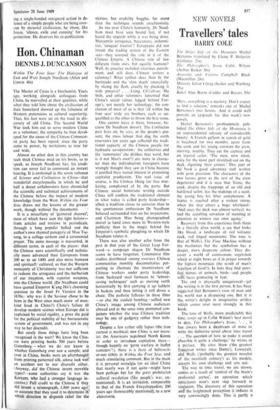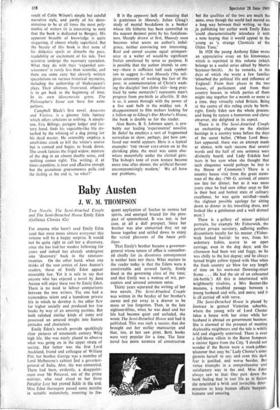NEW NOVELS
Travellers' tales
BARRY COLE
The Other Side of the Mountain Michel Bernanos translated by Elaine P. Halperin (Gollancz 21s) The Philosopher's Stone Colin Wilson (Arthur Barker 30s) Assassins and Victims Campbell Black (Macmillan 28s) Maundy Julian Gloag (Seeker and Warburg 35s) Babel Alan Burns (Calder and Boyars 30s) 'Here, everything is a mystery. Don't expect to find a solution,' remarks one of Michel Bernanos's two heroes. And it could well provide an epigraph for this week's new novels.
M ichel Bernanos's posthumously pub- lished The Other Side of the Mountain is an unprecedented odyssey of considerable beauty. A French galleon in search of gold is becalmed for two months; apart from the cook and his young assistant the crew, starving, mutiny. They eat the captain and an injured sailor. 'The men, now silent, were for the most part stretched out on the deck, digesting their crimes.' This part of the book is good adventure stuff written with grim precision. The characters of the two heroes grow as the rest of the crew degenerate and it is seen that Toine, the cook, despite the trappings of an old and hardened sailor, has the makings of a saint; the young boy his fitter complement. A hiatus is reached after a violent storm, when the ship enters a huge whirlpool: `And since the deck was almost vertical, we had the appalling sensation of standing at attention to witness our own agony.'
Recovery from this experience finds them in a literally alien world, a sea that looks like blood, a landscape of red volcanic rock, red tinged mountains. The tone is that of Wells's The Time Machine without the mechanics but the symbolism has a deeper, more desperate colour. They dis- cover a world of carnivorous vegetation which at night bows as if in prayer towards the highest mountain (the result of man's fejectjon of God?). In huts they find petri- fil statues of animals, birds—and people wi faces grimacing in fear.
The end is physically unequivocal—yet the writing is in the first person. It has been suggested that Bernanos's view of man and his world was a despairing one. But it is the writer's delight in imaginative artifice whir ch comes over most strongly in this book.
The tone of Wells, more predictably this time, crops up in Cohn Wilson's best novel to date, The Philosopher's Stone. `. . . it has always been a daydream of mine to write the definitive novel about time travel
. .. The question of how to make it sound plausible is quite a challenge,' he writes in a preface. He cites Shaw ('the greatest Eurppean writer since Dante'), Lovecraft, and Wells (`probably the greatest novelist of the twentieth century') as his models, accepts his own challenge and sets out.
The way to time travel, we are shown, comes as a result of 'control of the brain's prefrontal cortex', an operation which anticipates man's next step forward in evolution. The discovery of this operation
arid the heightened perception it induces is very convincingly done. This is partly a
result of Colin Wilson's simple but careful narrative style, and partly of his deter- mination to be at all times the most poly- mathic of writers (it is interesting to note that the book is dedicated to Borges). His apparent breadth of knowledge is quite staggering, if almost wholly superficial. But the beauty of this book is that none of his didactics spoils or disturbs the pace, readability or excitement of his tale. Two scientists undergo the necessary operation. What they do with their 'expanded con- sciousness' is rarely less than scientific, and there are some zany but cleverly written speculations on various historical mysteries, including the authorship of Shakespeare's plays. Their ultimate, frustrated, objective is to get back to the beginning of time. In its own idiosyncratic genre. The Philosopher's Stone can have few com- petitors.
Campbell Black's first novel, Assassins and Victims, is a gloomy little fantasy which offers solutions to nothing. A simple- ton, Eric Billings, paragon lodger and fac- tory hand, finds his vegetable-like life dis- turbed by the whining of a dog pining for his dead master. He ostensibly employ§ a small-time crook to kill the whine's source but is conned and begins to break down. The crook fancies the frigid widow, mistress of the dog in an almost double sense, and nothing comes right. The writing, if at times repetitive, is neat and effective enough but the gratuitous gruesomeness palls, and the feeling at the end is, `so what?'
It is the apparent lack of meaning that is gratuitous in Maundy, Julian Gloag's study of mental breakdown in a banker whose life hitherto has been controlled to the nearest decimal point by his fastidious- ness. Sharply drawn at first, Maundy soon becomes what seems an author's indul- gence, neither convincing nor interesting. Real and unreal assume equal unimport- ance in a welter of would-be significant frolics unrelieved by sense or purpose. It is possible that the author intends to con- vey—there is sufficient half cock symbol- ism to suggest it—that Maundy (`the reli- gious ceremony of washing the feet of the poor, in commemoration of Christ's wash- ing the disciples' feet (John xiii)—long prac- tised by some monarchs') represents man's progress from pre-birth to afterlife. If this is so, it comes through with the power of a five watt bulb in the midday sun. A disappointment to film makers looking for a follow-up to Gloag's Our Mother's House, the book is doubly so for the reader.
Alan Burns, B. S. Johnson apart, is pro- bably our leading 'experimental' novelist. In Babel he employs a sort of fragmented surrealism to show, perhaps, just how con- fused our world appears. Here is a typical
example: 'THE TRAMP COLLAPSED on to the
shrinking plate, the meal was eaten else- where mournfully under the clerical gaze.
The bishop's tone of even texture became more true after dinner, the artificial flavour uncompromisingly modern,' We all have our problems.



































 Previous page
Previous page